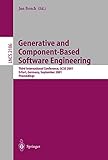Generative and Component-Based Software Engineering [electronic resource] : Third International Conference, GCSE 2001 Erfurt, Germany, September 10–13, 2001 Proceedings / edited by Jan Bosch.
Material type: TextSeries: Lecture Notes in Computer Science ; 2186Publisher: Berlin, Heidelberg : Springer Berlin Heidelberg, 2001Description: VIII, 184 p. online resourceContent type: text Media type: computer Carrier type: online resourceISBN: 9783540448006Subject(s): Computer science | Software engineering | Information Systems | Management information systems | Computer Science | Software Engineering | Management of Computing and Information Systems | Business Information SystemsAdditional physical formats: Printed edition:: No titleDDC classification: 005.1 LOC classification: QA76.758Online resources: Click here to access online
TextSeries: Lecture Notes in Computer Science ; 2186Publisher: Berlin, Heidelberg : Springer Berlin Heidelberg, 2001Description: VIII, 184 p. online resourceContent type: text Media type: computer Carrier type: online resourceISBN: 9783540448006Subject(s): Computer science | Software engineering | Information Systems | Management information systems | Computer Science | Software Engineering | Management of Computing and Information Systems | Business Information SystemsAdditional physical formats: Printed edition:: No titleDDC classification: 005.1 LOC classification: QA76.758Online resources: Click here to access online  E-BOOKS
E-BOOKS
| Current library | Home library | Call number | Materials specified | URL | Status | Date due | Barcode |
|---|---|---|---|---|---|---|---|
| IMSc Library | IMSc Library | Link to resource | Available | EBK5013 |
Invited Paper -- A Characterization of Generator and Component Reuse Technologies -- Software Product Lines -- A Standard Problem for Evaluating Product-Line Methodologies -- Components, Interfaces and Information Models within a Platform Architecture -- XVCL Approach to Separating Concerns in Product Family Assets -- Aspects -- AspectJ Paradigm Model: A basis for Multi-paradigm Design for AspectJ -- Aspect-Oriented Configuration and Adaptation of Component Communication -- A Version Model for Aspect Dependency Management -- An Object Model for General-Purpose Aspect Languages -- Generic and Generative Approaches -- Generic Visitor Framework Computing Statistical Estimators -- Base Class Injection -- Reflection Support by Means of Template Metaprogramming -- Components and Architecture -- Scenario-Based Generation and Evaluation of Software Architectures -- The Role of Design Components in Test Plan Generation -- Retrieving Software Components Using Directed Replaceability Distance -- Generating Application Development Environments for Java Frameworks.
The size, complexity, and integration level of software systems is increasing c- stantly. Companies in all domains identify that software de?nes the competitive edge of their products. These developments require us to constantly search for new approaches to increase the productivity and quality of our software - velopment and to decrease the cost of software maintenance. Generative and component-based technologies hold considerablepromise with respect to achi- ing these goals. GCSE 2001 constituted another important step forward and provided a platform for academic and industrial researchers to exchange ideas. These proceedings represent the third conference on generative and com- nent-based software engineering. The conference originated as a special track on generative programming from the Smalltalk and Java in Industry and - ucation Conference (STJA), organized by the working group “Generative and Component-Based Software Engineering” of the “Gesellschaft fur ¨ Informatik” FG 2.1.9 “Object-Oriented Software Engineering.” However, the conference has evolved substantially since then, with its own, independent stature, invited speakers, and, most importantly, a stable and growing community. This year’s conference attracted 43 submissions from all over the world, - dicating the broad, international interest in the research ?eld. Based on careful review by the program committee, 14 papers were selected for presentation. I would like to thank the members of the program committee, all renowned - perts, for their dedication in preparing thorough reviews of the submissions.


There are no comments on this title.